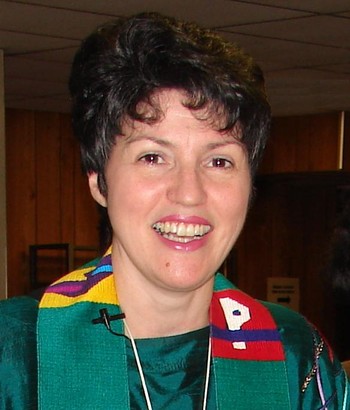A space for a contemporary woman disciple to give voice to justice concerns in a world where some still think that women’s words are just leros (Greek for “nonsense”) or, in Spanish, disparates
 Talitha koum
Talitha koum
A reflection and confession based on Mark 5:21–24, 35–43
by Magdalena I. García
When Jesus had crossed again in the boat to the other side, a great crowd gathered around him; and he was by the sea. Then one of the leaders of the synagogue named Jairus came and, when he saw him, fell at his feet and begged him repeatedly, “My little daughter is at the point of death. Come and lay your hands on her, so that she may be made well, and live.” So he went with him. [ . . . ] While he was still speaking, some people came from the leader’s house to say, “Your daughter is dead. Why trouble the teacher any further?” But overhearingwhat they said, Jesus said to the leader of the synagogue, “Do not fear, only believe.” He allowed no one to follow him except Peter, James, and John, the brother of James. When they came to the house of the leader of the synagogue, he saw a commotion, people weeping and wailing loudly. When he had entered, he said to them, “Why do you make a commotion and weep? The child is not dead but sleeping.” And they laughed at him. Then he put them all outside, and took the child’s father and mother and those who were with him, and went in where the child was. He took her by the hand and said to her, “Talitha koum,” which means, “Little girl, get up!” And immediately the girl got up and began to walk about (she was 12 years of age). At this they were overcome with amazement. He strictly ordered them that no one should know this, and told them to give her something to eat. —Mark 5:21–24, 35–43
We hear the commotion . . .
People weeping and wailing loudly
everywhere
in the houses of divine worship
and statistical reports
time and again:
“She’s dead, the church is dead.”
We hear the calmness . . .
Jesus talking and affirming softly
out of nowhere
in the houses of common people
and popular hearsay
time and again:
“She is not dead, but sleeping.”
The church sleeps
sedated by half truths
drugged by vested interests
cushioned by stocks and dividends
covered by insurance policies.
And while the church sleeps
the drive to embody the good news
to those who are enslaved
by poverty and wealth
lies dead.
But every now and then
through the voice of our conscience
and the disturbances of the crowd
we hear echoes
of the disquieting voice of Jesus:
“Talitha koum.”
Forgive us, Awakened God,
for spending our life sleeping
indifferent to the injustices
that make the world lie awake.
Forgive us, Living God,
for wasting our life dying,
indifferent to the struggles
that make the world new life beget.
Magdalena I. García is a PC(USA) teaching elder and a hospice chaplain for Vitas Healthcare in Chicago. She is a graduate of McCormick Theological Seminary and a recipient of the 2008 PC(USA) Women of Faith Award. For permission to use content, write to magdalenagarcia@comcast.net.

Vacant lot in an impoverished area of Chicago, highly populated by people of color and adjacent to the Cook County Juvenile Justice Center
Talita cumi
Una reflexión y confesión basada en Marcos 5:21–24, 35–43
por Magdalena I. García
Jesús regresó en una barca a la otra orilla, y como una gran multitud se reunió alrededor de él, decidió quedarse en la orilla del lago. Entonces vino Jairo, que era uno de los jefes de la sinagoga, y cuando lo vio, se arrojó a sus pies y le rogó con mucha insistencia: «¡Ven que mi hija está agonizando! Pon tus manos sobre ella, para que sane y siga con vida.» Jesús se fue con él, y una gran multitud lo seguía y lo apretujaba. […] Todavía estaba él hablando cuando de la casa del jefe de la sinagoga vinieron a decirle: «Ya no molestes al Maestro. Tu hija ha muerto.» Pero Jesús, que oyó lo que decían, le dijo al jefe de la sinagoga: «No temas. Sólo debes creer.» Y con la excepción de Pedro, Jacobo y Juan, el hermano de Jacobo, no permitió que nadie más lo acompañara. Cuando llegó a la casa del jefe de la sinagoga, vio mucho alboroto, y gente que lloraba y lamentaba. Al entrar, les dijo: «¿A qué viene tanto llanto y alboroto? La niña no está muerta, sino dormida.» La gente se burlaba de él, pero él ordenó que todos salieran. Tomó luego al padre y a la madre de la niña, y a los que estaban con él, y entró adonde estaba la niña. Jesús la tomó de la mano, y le dijo: «¡Talita cumi!», es decir, «A ti, niña, te digo: ¡levántate!» Enseguida la niña, que tenía doce años, se levantó y comenzó a caminar. Y la gente se quedó llena de asombro. Pero Jesús les insistió mucho que no dijeran a nadie lo que había ocurrido, y les mandó que dieran de comer a la niña. —Marcos 5:21–24, 35–43
Oímos el alboroto . . .
Gente llorando y lamentándose ruidosamente
por todas partes
en las casas de adoración divina
y los informes estadísticos
vez tras vez:
“Está muerta, la iglesia está muerta”.
Oímos la calma . . .
Jesús hablando y afirmando suavemente
cuando menos lo esperamos
en las casas de gente común
y las habladurías populares
vez tras vez:
“No está muerta, está dormida”.
La iglesia duerme
sedada por las medias verdades
drogada por los intereses creados
acojinada por las acciones y dividendos
tapada con las pólizas de seguro.
Y mientras que la iglesia duerme
el impulso por encarnar las buenas nuevas
a quienes están esclavizados
por la pobreza y la riqueza
yace muerto.
Pero de vez en cuando
en la voz de nuestra conciencia
y los disturbios de la multitud
oímos ecos
de la voz inquietante de Jesús:
“Talita cumi.”
Perdónanos, Dios Despierto,
por pasarnos la vida durmiendo
indiferentes ante las injusticias
que tienen al mundo desvelado.
Perdónanos, Dios Vivo,
por desperdiciar la vida muriendo,
indiferentes ante las luchas
que en el mundo nueva vida han engendrado.